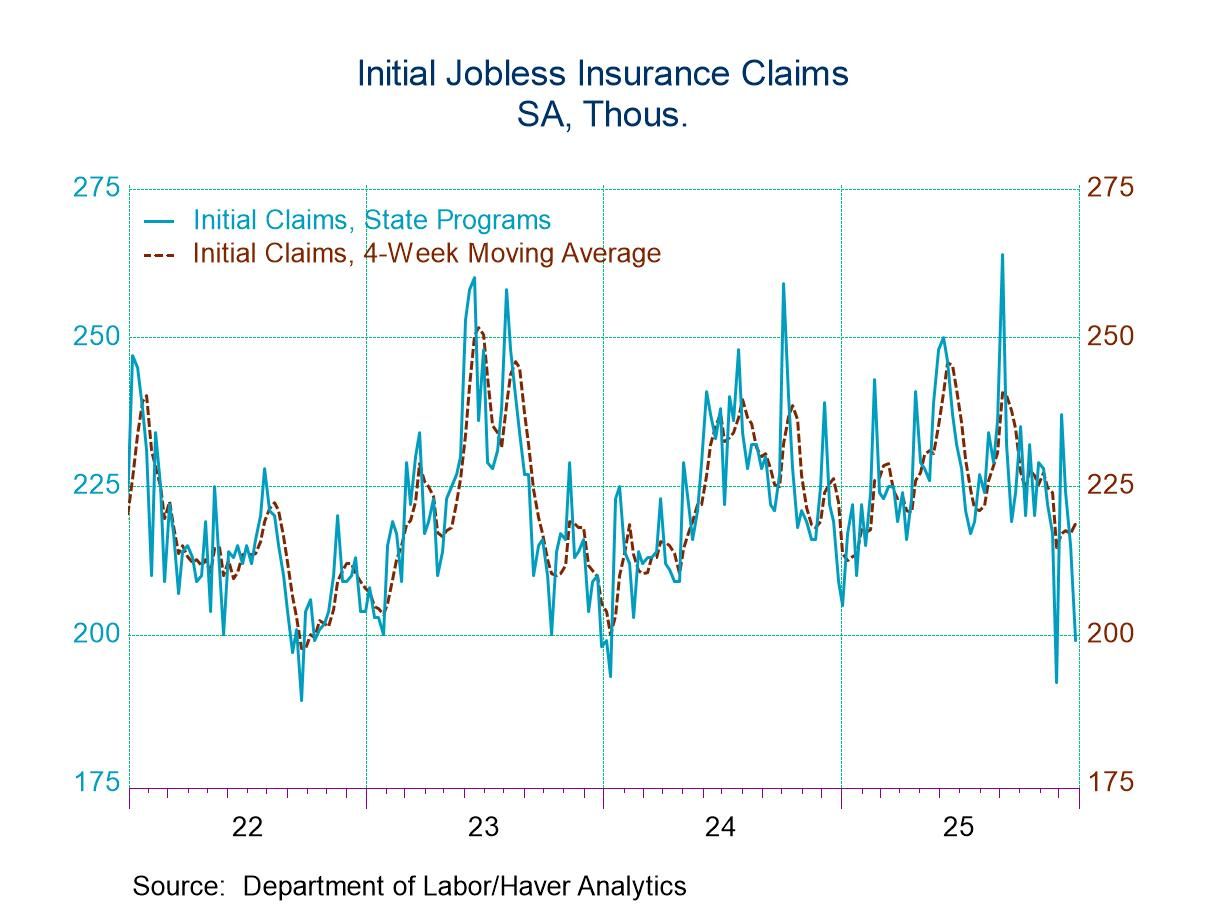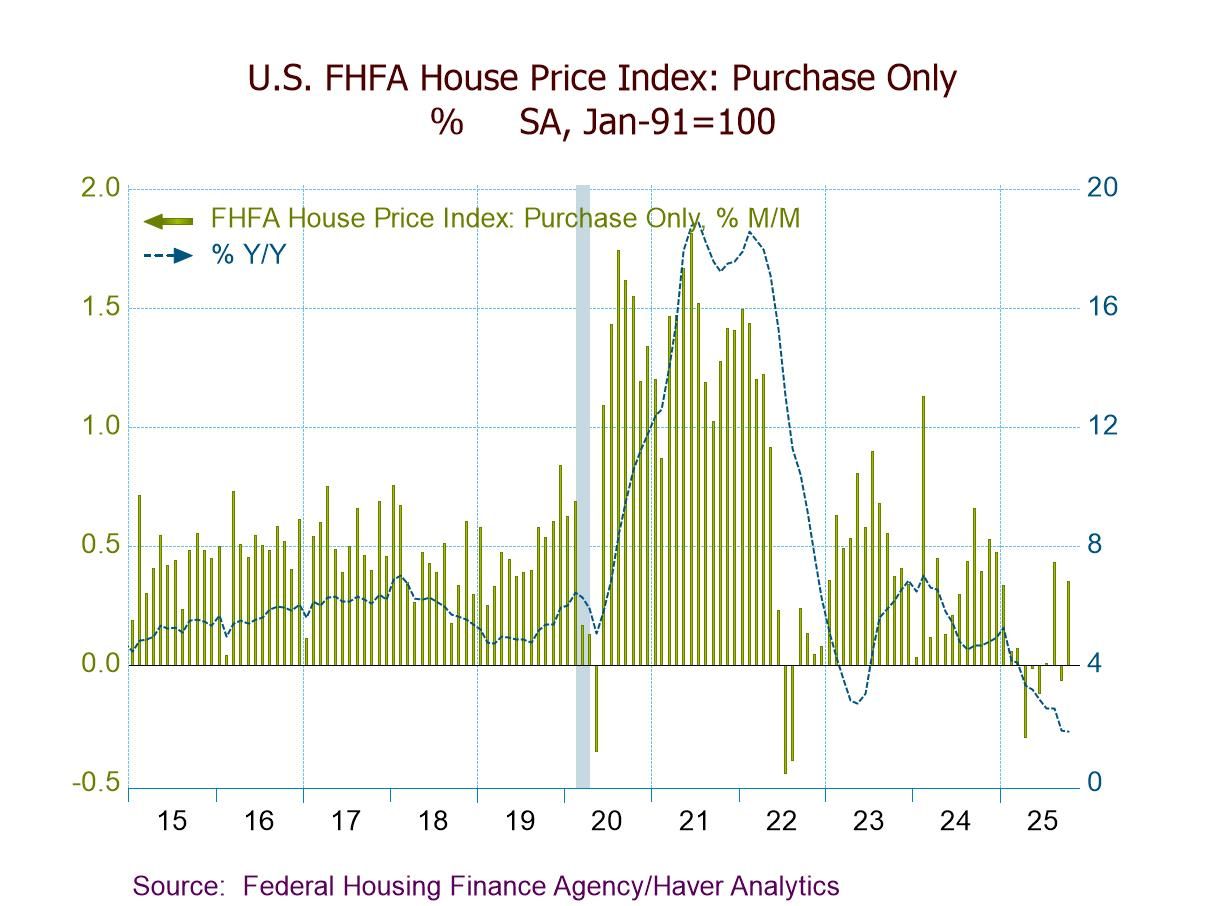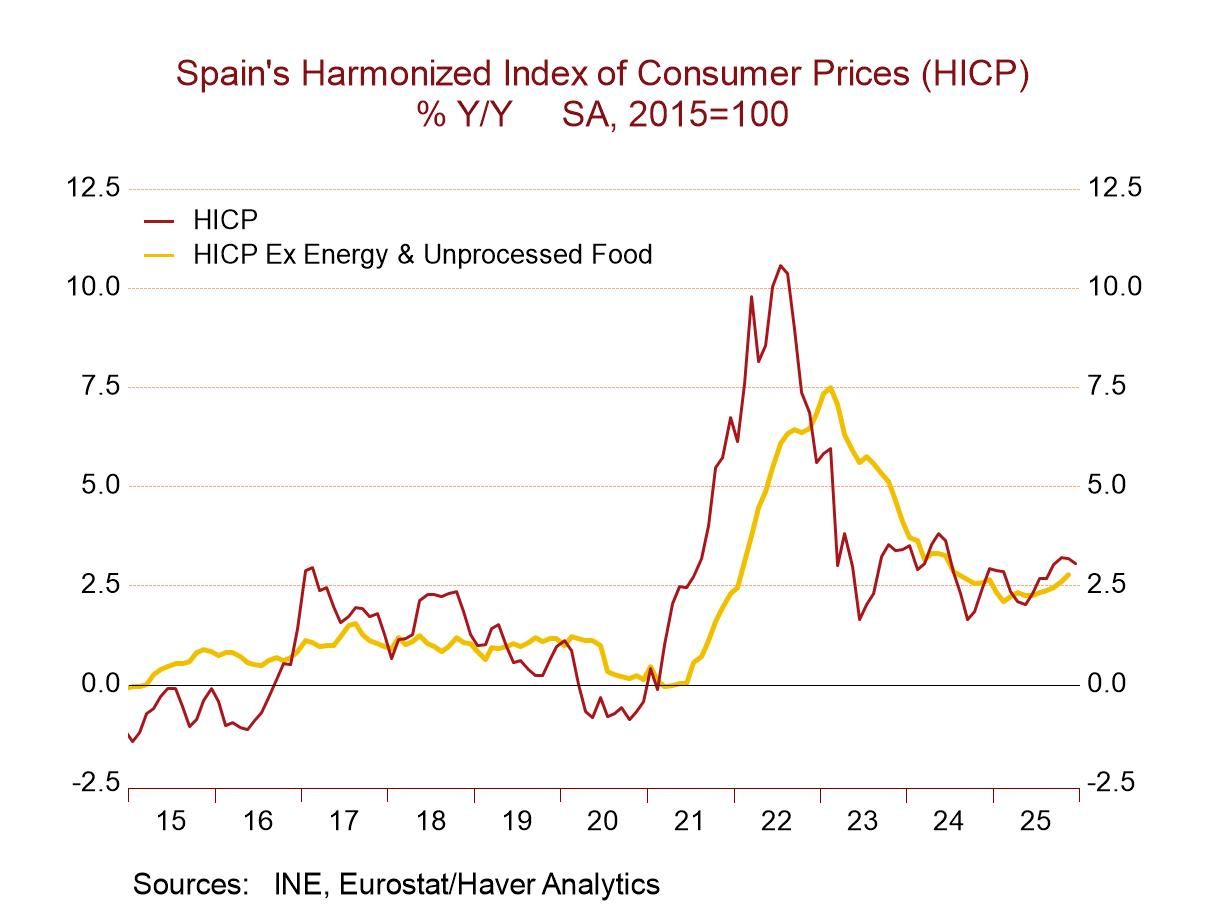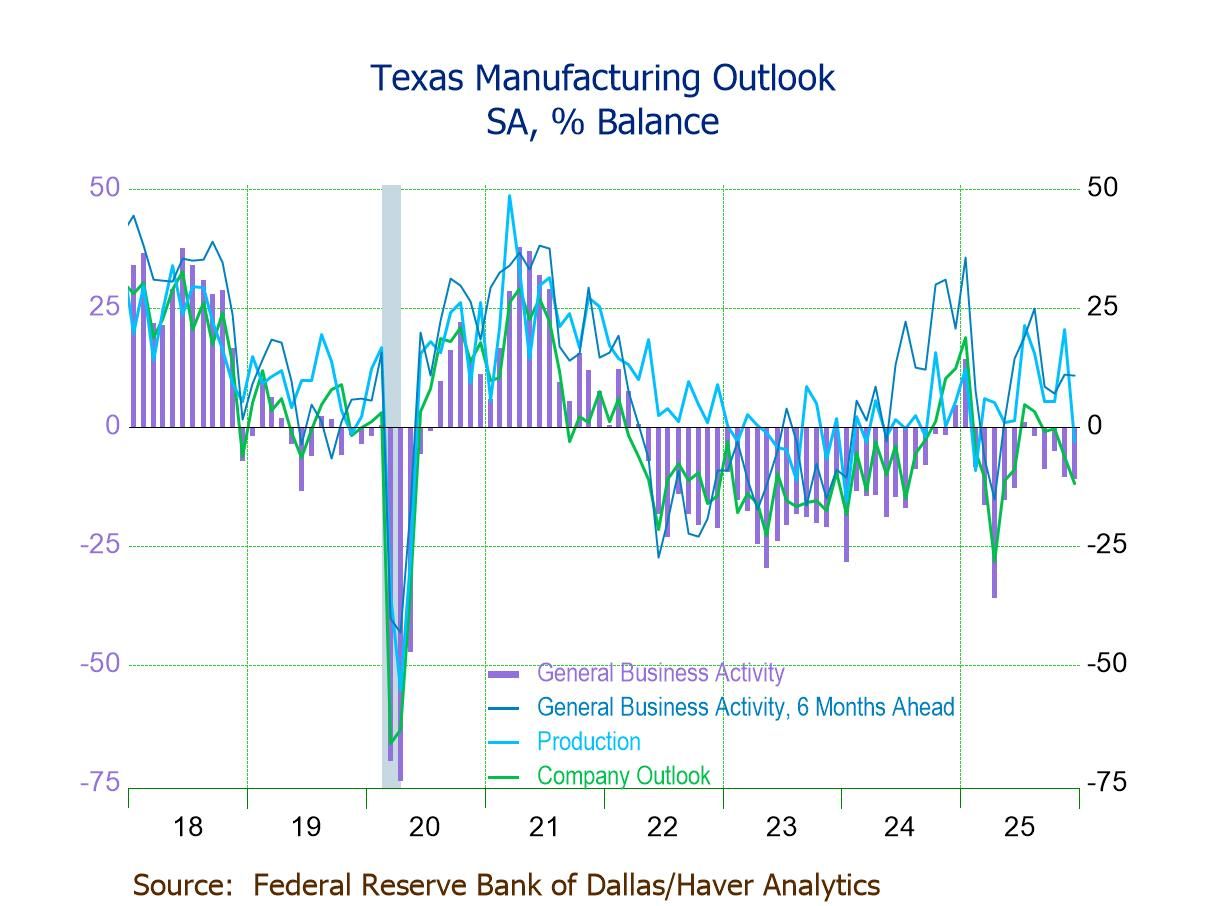 Global| Oct 26 2011
Global| Oct 26 2011UK Industrial Orders Go Crashing Down
Summary
Weak orders and weak trends: Total UK industrial orders are lower, much lower in October, dropping from a -9 (where they slipped last month from a +1 in August) to a -18. Oh, how quickly optimism can fade - faster than a new pair of [...]
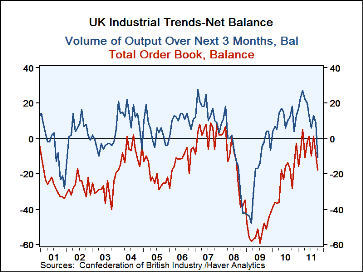 Weak orders and weak trends:
Weak orders and weak trends:
Total UK industrial orders are lower, much lower in October, dropping from a -9
(where they slipped last month from a +1 in August) to a -18. Oh, how quickly
optimism can fade - faster than a new pair of jeans in a vat of bleach.
Export orders, too, took a tumble. After dropping to -12 in September from zero in August, export orders are back in the ‘soup’ at -14.
Meanwhile stocks of finished goods are still piling up, posting a +21 reading for the second month in a row.
The look-ahead volume expectation is rated at -11, the same as last month, even though actual orders have deteriorated by more. But the chart shows that when orders fall off sharply the distance between orders and expected volume gets pinched as producers just can’t bear to extrapolate the bad news. Expected output volume is almost always better than actual orders growth. But just like in 2007 and in 2008 the distance between the expected volume of output and orders is being pinched. This has, historically, been a bad sign about things to come. Expected output drops simply rarely leap-frog ahead of actual orders weakness. All they do is to pinch the gap.
A gap in the UK orders/outlook gap - So the orders/expected-output gap does not necessary tell the whole story. That it is in denial is all we need to know to go hunting for truth elsewhere. The expected volume figure itself resides in the 44th percentile of this historic range, a weak standing but not terrible. But the ranking statistic tells a bit more of the truth. If we place the expectations for output over the next three months in its historic queue of observations the -11 reading ranks it in the bottom 12.7% of its queue. And THAT my friend is weak indeed. Total orders and export orders stand in the mid- to high-fifties percentile of their historic high-low range. They are not too different if we reassess them in their respective historic queues of data. It is in the output data that it appears firms have cut to the bone and are reluctant to cut further even in the face of falling orders.
UK MFG is in trouble...and it’s not alone -- In any event, it is clear that UK manufacturing is in trouble; both domestic and export orders are weak. Finished stocks are still being built. This is the way to a deeper downtrend. With everyone fighting over the next plans for Europe, even though they should cobble one together, I don’t think it holds a lot of hope. I am very concerned about a plan to keep the Zone together when in fact a number of countries, led by Greece, have lost so much competiveness to Germany while they have been sequestered in the same Zone with the same rules and the same monetary policy. If you keep them in the Zone then what? How does their lot improve? Through prayer? Competitiveness problems in the Zone are so severe that Greece, Spain, and Portugal have run nothing but current account deficits for the last 12 years straight! Italy has run a current account deficit in 11 of the past 12 years. How does keeping these counties in the Zone at the same uncompetitive exchange rate help them? It’s like locking a bunch of sheep in a room full of hungry lions. Germany while ‘protesting’ is already belching and licking its lips at the thought of the never-ending snack for its exporters.
More Euro-vultures - Meanwhile, Denmark, Finland, Norway, the Netherlands, Sweden, and Switzerland – all European but not all EU or EMU members - have run 12 straight –years of surpluses in their current accounts. Europe has some chronic balance of payments and competitiveness problems that the expected Europe financial fix will not fix.
Euro fashion: Off-the-rack clothes for the odd body types- Pushing the square peg into the round hole of despair does not seem a productive endeavor. It is far from clear how the chronic Euro-deficit countries (that we have previously identified as countries that run inflation rates well above the average in the Zone) are going to fare if they remain ‘trapped’ in the Euro-Area under policies not tailor-made for them and their special problems. But there they are. The political scientist in me understands the need for European solidarity (Sarkozy!). But the hard bitten German reluctance to finance rogue states appeals to the economist in me. It cannot see how the uncompetitive states that have fostered price levels that have exceed the post Zone formation inflation run up in Germany by 20% (or more in some cases) can possibly survive.
One for all and all for...someone, something? Is getting a euro–solidarity plan even a good idea? In today’s FT Martin Wolf, one of my favorite commentators, points to the worse market treatment of several EMU member states compared to the UK - even though the UK debt and deficit metrics are every bit as bad or worse in some cases - holding this as evidence of some sort of irrationality or market imperfection. I disagree. In the end the UK has a lot more going for it.
The UK ‘has’ Vs the have-nots - The UK HAS its own central bank. It HAS its own currency. It may have a conservative Government; that could change. The EMU countries are hopelessly stuck in EMU absent the equivalent of a nuclear political event. The UK is much better able to deal with its issues for those reasons. How can Italy, Spain, Portugal and Greece maneuver in a land where they do not HAVE control of the money supply? They do not HAVE interest rate control. They do not HAVE control of the currency. Instead, they are being forced into an austerity that is ripping the social fabric of their respective countries apart, creating political instability. In a more perfect world the political dialogue would come first. But each of these nations pushed political will over economic constraint so hard that now there is no choice. And the shock treatment is painful, destabilizing, and has no grass roots support, only the political technocrats understand the ‘need’ for it. The ‘people’ thought life in EMU would be better, not worse.
Humpty dumpty fell off a wall... I think Martin has missed the boat on this one. And the ship he has chosen is still sinking even if Europe today comes up with a plan. It will still need a plan B down the road because financing alone cannot solve the European problem. Moreover, austerity in the required dosage would kill the patient. No one in Europe seems to have a clue since all they are focused on is gluing Humpty back together. You can do it and it will hold for a while but it will never be the same, nor will it last. The euro-dream needs to hit the reset switch.
| UK Industrial Volume Data CBI Survey | ||||||||||
|---|---|---|---|---|---|---|---|---|---|---|
| Reported: | Nov 11 |
Oct 11 |
Sep 11 |
Aug 11 |
Jul 11 |
12Mo Avg |
%tile | Max | Min | Range |
| Total Orders | -- | -18 | -9 | 1 | -10 | -6 | 58% | 13 | -61 | 74 |
| Export Orders | -- | -14 | -12 | 0 | -8 | -1 | 55% | 20 | -55 | 75 |
| Stocks: FinGds |
-- | 21 | 21 | 14 | 12 | 9 | 70% | 31 | -2 | 33 |
| Looking Ahead | ||||||||||
| Output Vol: Nxt 3M |
-11 | -11 | 9 | 13 | 6 | 15 | 44% | 36 | -48 | 84 |
| Avg Prices 4Nxt 3m |
1 | 13 | 9 | 4 | 27 | 22 | 47% | 36 | -30 | 66 |
Robert Brusca
AuthorMore in Author Profile »Robert A. Brusca is Chief Economist of Fact and Opinion Economics, a consulting firm he founded in Manhattan. He has been an economist on Wall Street for over 25 years. He has visited central banking and large institutional clients in over 30 countries in his career as an economist. Mr. Brusca was a Divisional Research Chief at the Federal Reserve Bank of NY (Chief of the International Financial markets Division), a Fed Watcher at Irving Trust and Chief Economist at Nikko Securities International. He is widely quoted and appears in various media. Mr. Brusca holds an MA and Ph.D. in economics from Michigan State University and a BA in Economics from the University of Michigan. His research pursues his strong interests in non aligned policy economics as well as international economics. FAO Economics’ research targets investors to assist them in making better investment decisions in stocks, bonds and in a variety of international assets. The company does not manage money and has no conflicts in giving economic advice.



